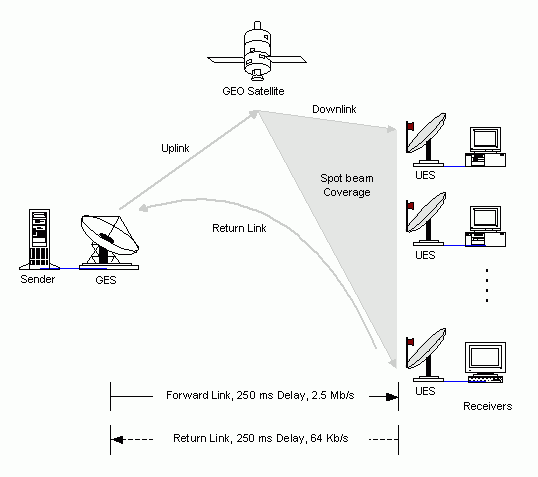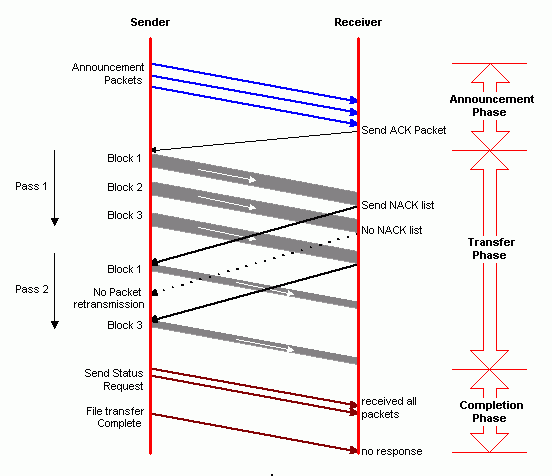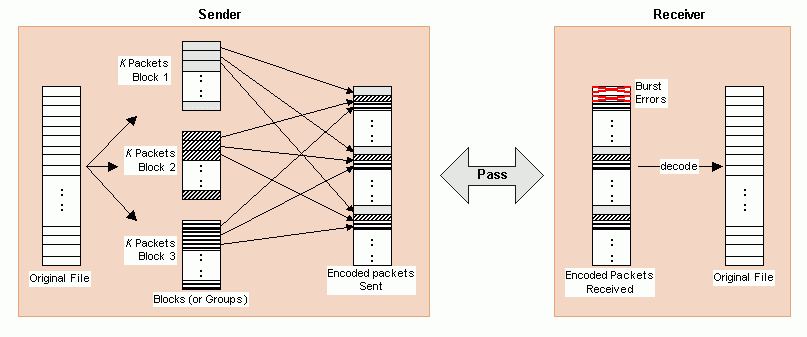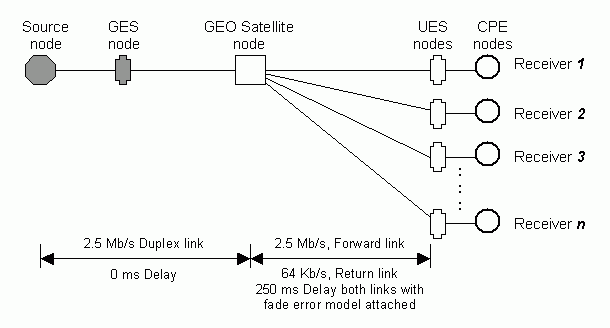 | Reliable Multicast Protocol Evaluation using ns |
 |
The subject of suitability and performance of reliable multicast transport protocols, especially via satellite
networks, has generated a lot of research interest. Nevertheless, limited research has been done to analyse the
performance of different reliable multicast transport techniques via satellite networks with persistent fades.
As a motivation, in work package WP2400, we analysed performance of a selected set of Reliable Multicast Transport (RMT)
protocols suited for satellite networks.
One of the main challenges facing different reliable multicast transport techniques is the ability to scale to large number of heterogeneous receivers. The suitability of satellite networks for large receiver coverage poses more challenges especially when receivers in a multicast group experience heterogeneous data transmission (i.e. with varying packet loss), and therefore in need of different packet retransmission. In this work package WP2400, we analysed (using ns simulation) the scalability of three sets of RMT protocols: analytical File Transfer Protocol (aFTP), Multicast File Transfer Protocol (MFTP) and Multicast File Transfer Protocol with Erasure Correction (MFTP/EC), based on performance for different receiver group sizes with varying file sizes, packet sizes and data transmission rates. Simulation conducted was based on GEOCAST Scenario I. |
 | GEOCAST Scenario I |
 |  |
 | analytical File Transfer Protocol (aFTP) |
 |
aFTP is an analytical file transfer protocol, similar to Digital Fountain (DF) multicast protocol, used for transmitting data packets from a single source to several receivers. It relies on a carousel mode of transmission, where by source information, is transmitted repeatedly to receivers to guarantee reliability. The protocol design and functionality assumes that:-
|
 | Multicast File Transfer Protocol (MFTP) |
 |
Multicast File Transport Protocol
(MFTP), is a one-to-many reliable multicast protocol. As shown below, MFTP protocol operation consists of
three phases:
|
 |  |
 | Multicast File Transfer Protocol with Erasure Correction (MFTP/EC) |
 |
Multicast File Transport Protocol with
Erasure Correction (MFTP/EC) is a continuous based ARQ reliable multicast protocol similar to MFTP. MFTP/EC
uses erasure correction methods, based on Reed-Muller codes of order one (1), to perform loss recovery more
efficiently than MFTP.
As shown in figure below, both MFTP/EC sender and receiver partition sets of data packets into n groups (blocks), where n > 10,000 and group consists of k packets each. Similar to MFTP, MFTP/EC sender interleaves encoded data packets from each block and transmit the encoded packets to receivers. MFTP/EC receivers experiencing loss, send back NACK-bitmaps after a complete file transmission, indicating the packets that were not received successfully. In the second and subsequent passes, the sender multicasts redundant repair packet, one for each NACKíed group. Ideally, this makes the recovery passes in MFTP/EC only last up to a fraction (1/k) of a full MFTP pass (though in general, MFTP/EC needs more passes than the basic MFTP protocol). The efficiency of the MFTP/EC protocol is determined by the value of k. The higher the value of k, the more likely lost packets within a group can be repaired when redundant packets are received. However, this comes at a cost due to high processing power and disk read/write at the sender. Likewise, lower values of k reduce the gain in erasure correction. In the ns simulation work (conducted in work package WP2400), the value of k = 32 for MFTP/EC and in the extreme case k = 1, which operates effectively as MFTP. |
 |  |
 | ns Simulation Scenario |
 |  |
 | Related Resources |
 |
|
 | Go Back |
